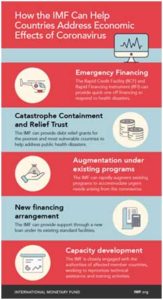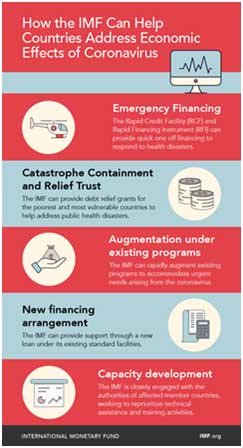
Active Citizens, Development & Aid, Economy & Trade, Global, Headlines, Health, Humanitarian Emergencies, Labour, TerraViva United Nations
– The coronavirus (COVID-19) pandemic has created an unprecedented human and economic crisis. Governments are taking strong actions, enforcing quarantines to reduce contagion, testing populations, building emergency intensive care units. Governments have also launched large fiscal stimulus plans to protect jobs and the economy, as well as temporary social protection programs such as income/food support, subsidies to utilities and care services.

Isabel Ortiz
But in many countries, even stronger actions are needed if we are to protect lives and jobs. States must respond adequately to this public emergency. Citizens must question if the measures implemented by their governments are sufficient and adequate.
The following are important issues for citizens and civil society organizations (CSOs) to watch out at the country level:
- 1. It is time to invest in universal public health, not only emergency support. Given COVID-19, governments are advised to ramp up public health expenditures. Indeed, respirators, tests and masks are necessary, but countries need more than just emergency support. There is a risk that, as governments will become indebted, they continue with austerity cuts and privatizations that have been eroding public health systems in recent years, returning to a situation where millions are excluded from healthcare.
2. Stimulating the economy and employment. This is much necessary to support job-generating enterprises during the COVID-19 lockdown. However, citizens need to be vigilant that fiscal stimulus do not go to the wrong hands, to large corporations avoiding taxes, to cronies, to the untaxed financial sector. If public funds are given to companies, it should be with strict conditions to stop tax evasion and share buybacks, undergo adequate regulation, cut obnoxious management bonusses, pay living wages and preserve employment.
3. Providing social protection, income and food support to people. These measures are extremely urgent if people are to be quarantined and are unable to telework. In developing countries, most work precariously in the informal economy and isolation is not possible, households will suffer hunger with no income. Given the low living conditions in most developing countries, policymakers should consider the need for universal social protection floors.
4. Governments need more executive powers to implement these measures. States and public policies have been weakened over the last decades by deregulations, privatizations and budget cuts. Better planning, better resources and better public policies for all citizens are needed, but it is important to ensure that far right and authoritarian leaders do not use the need for decisive executive action to grab more power for their own ends (eg. Brazil, Hungary, India, Philippines, US).
Additionally, it is important for citizens and CSOs to push for the following measures at the global level:

Walden Bello
- 5. Support for global public health, at stake is the survival of the planet. The coronavirus pandemic has revealed the weak state of global public health systems – generally overburdened, underfunded and understaffed because of earlier austerity policies and privatizations. There is urgent need to improve the global governance of health, including the strengthening the WHO and UN agencies that support the extension of public health systems, as well as CSOs monitoring progress.
6. Put pressure on the international financial institutions such as the IMF and the development banks, so their policies support universal public health systems, jobs and social protection floors at present as well as after the COVID-19 emergency, including resources and fiscal space to finance them.
7. Given high sovereign debt levels, continue lobbying for debt forgiveness or radical debt relief to ensure that countries get the needed financing; or at least a debt moratoria, and later debt restructuring/relief.
8. Watch out that new debt and fiscal deficits created to respond to COVID-19 do not result in a new round of austerity cuts with negative social impacts that will undermine public health systems, jobs and social protection.
9. Ensure capital controls. Capital is flying North to safety, to the US, to Europe. Developing countries are going to be hard hit, not only because of the capital drain but also from the fall of commodity prices and others. Capital controls are easy to implement, with immediate results.
10. A Global Marshall Plan, or a Global Green New Deal. Global problems require global solutions; after the WW2, the US implemented a Marshall Plan to rebuild Europe. This time, no country alone can or should finance a global plan, it can be built as part of a progressive multilateralism. There are many ways to finance it, solidarity taxes to wealth may well be a best way to reduce inequalities and even up world’s development. It can be complemented by other measures such as issuing more Special Drawing Rights (SDRs) at the international organizations.
The coronavirus pandemic has provided stark evidence of the weaknesses and extreme injustices of our world. We must not return to “normality”, a world where half of its population is living below the poverty line of $5.50 a day. We must move away from an inequitable model based on unregulated finance and corporate power, blind to harmful social and environmental impacts. We must back away from a system that disregards the work of health staff, cleaners, garbage collectors, farmers, and instead reward with huge salaries corporate managers, football players, and others who do not perform any essential activity. Now citizens have the opportunity to move forward.
As countries and enterprises recuperate from the crisis, they will have to rethink their economic model, including fewer links with global supply chains, and more links closer to home. It will be an important time for citizens and CSOs to press for “deglobalization”, making the domestic market again the center of gravity of the economy by preserving local production with decent jobs and green investments, and question global supply chains based on taking advantage of cheaper wages, lesser taxes and environmental regulations elsewhere.
Now is the time for citizens to ensure that world leaders forcefully respond to the COVID-19 crisis, in accordance with human rights. This time it cannot be like many earlier crisis experiences, where insufficient support was provided, or ended in the wrong hands, bailing out banks not the population. Citizens and CSOs have a very important role to play to ensure that governments respond to people.
Isabel Ortiz is Director of the Global Social Justice Program at the Initiative for Policy Dialogue, Columbia University, and former director of the International Labour Organization (ILO) and UNICEF.
Walden Bello is senior analyst at the Bangkok-based Focus on the Global South and the International Adjunct Professor of Sociology at the State University of New York at Binghamton.



